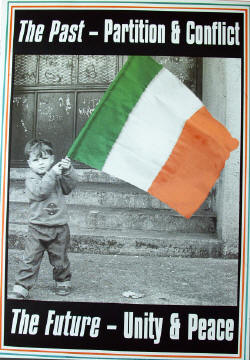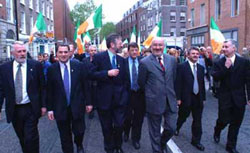 |
Irisch
Republikanische Solidarität
|
 |
Bloody Sunday General accused of fabricating evidence
As the Bloody Sunday Inquiry draws to a close for the summer recess,
one of Britain's most senior army officers is facing allegations that
he misled the inquiry when giving evidence earlier this year.
Lord Saville is currently considering a request from lawyers for the
families that General Mike Jackson be recalled to the inquiry for
further questioning, after serious discrepancies between his account of
Bloody Sunday and that of Major Edward Loden, Commander of Support
Company, emerged during the latter's evidence at the end of June. These
discrepancies, argue the lawyers, strongly suggest that Jackson was
involved in fabricating evidence in order to justify the killings of 14
civil rights demonstrators in Derry on January 30, 1972.
All of this centres on a document, agreed to be in Jackson's
handwriting but signed by Loden, which was only submitted by the MoD
during Loden's evidence. This document lists the number and type of
'engagements' made by the army on Bloody Sunday, including assorted
'gunmen', 'nail bombers' and 'acid bombers'. Jackson previously told
the inquiry he was not involved in drawing up any 'shot-list'.
Whilst in the witness box, Loden repeatedly claimed to have interviewed
the men under his command immediately after the shootings on Bloody
Sunday. He claimed that, based on what his men told him, he produced a
report including an accurate list of 'targets' engaged and handed it to
Battalion HQ to be typed up. This list, he said, was included in the
official situation report.
It was pointed out by Michael Mansfield QC that no one at HQ recalled
receiving such a list from him. Mansfield also asked why, prior to the
Saville Inquiry, Loden had never mentioned passing on his list before.
Loden was unable to explain; neither could he explain why a typed
document would need to be rewritten by hand or account for the glaring
discrepancies between the typed and handwritten lists.
In submissions to the inquiry, it was suggested by Mansfield that the
document written by Jackson, was "bogus" and had been put together
in
Battalion HQ days after Bloody Sunday in order to justify the number of
rounds used and the number of dead.
The list, he argued, was drawn up after Loden's attendance at battalion
HQ, not in the back of a Pig, as Loden claims, because he "realised
he
was in trouble and that he had to explain to somebody higher up what
had happened. "Interestingly, if you add up the number of people
supposedly dead on his shot list, it will not come as any surprise, it
comes to 13. We say the only reason this shot list came into existence
was to explain 13 deaths."
Lord Saville asked whether the suggestion was that Loden had "sat
down
with Jackson and compiled an imaginary list of engagements".
Mansfield replied that "all we can do is infer this is not a genuine
document. It has arisen, we submit, after he went to battalion HQ. One
possible route is that he has deputed somebody to go away and compile
a
report that he can submit, explaining the actions of the day and in
particular the engagements that Support Company have been involved in."
During the questioning of Loden, Mansfield pointed out that, amongst
the many deficiencies in Loden's so-called list was the absence of any
mention of the shooting of Bernard McGuigan. He questioned why none of
Loden's men had thought to tell him about a "middle-aged man,
sheltering near a telephone box, who walks out holding a white
handkerchief and is shot dead.
"They cannot have forgotten when they spoke to you - F cannot have
forgotten when he spoke to you, it must have been one of the last
things he did," he said. "It tends to suggest, does it not,
that they
were not being frank with you - if you did the interviewing process?"
Loden insisted that he had interviewed the soldiers. "I do not know
how
many times I have told you, I interviewed these soldiers in the back of
my pig. It is not an invention and you will never ever shake me from
that, Mr Mansfield."
If that was indeed the case, asked Mansfield, did Loden "accept any
responsibility for what the soldier did who shot Mr McGuigan"?
"I accept responsibility in that I was in command of that company,"
replied Loden, "but I did not squeeze the trigger on this particular
occasion. I was not able to look down the sights of the chap's rifle
and therefore I cannot tell you whether he was correct or not in
opening fire."
Letzte Änderung:
06-Sept-03